- Home
- Julie Smith
True-Life Adventure Page 6
True-Life Adventure Read online
Page 6
I waited fifteen minutes, maybe, and Brissette didn’t turn up.
A million things could happen to a supervisor on the way to the men’s room— he could run into loquacious old pals or pleading supplicants. Or angry constituents, or nosy newsmen. Any of these would slow his progress.
Or he might drop into the second-floor pressroom for a chat, or pop down to the cigar stand for a candy bar. He could even duck into a phone booth and call his girlfriend. But Brissette was divorced, so he wouldn’t need privacy for that. Well, he could call one of those ladies who talk dirty and put their fee on your credit card. I didn’t have anything to read, so I just let the possibilities run through my head.
But since I have a short attention span, pretty soon I started thinking about how to improve the quality of my waiting life. I could go buy a magazine, but that would cost a buck and a half or so. I could walk across the hall to the pressroom and renew old acquaintances, but that would be depressing. It might remind me that I might have to apply for a permanent job in a pressroom if things didn’t get better.
Kathy Wong wasn’t depressing, though. She covered the courts for the Examiner and she worked out of a different pressroom— the one on the fourth floor. She kind of had a way of lifting a person’s spirits just by being alive. I wondered if she was dating anybody. And then I remembered that I was currently employed by her competition, which meant I couldn’t tell her my troubles even if I could lure her out for a drink. So much for Miss Wong.
On the other hand, the fourth-floor pressroom was the one broadcast people worked out of on the rare occasions that they graced City Hall with their august presences. Reporting sullied their images, so they didn’t do too much of it. But maybe some of them would be there today, and maybe I could pick up some gossip about Lindsay Hearne. Or better yet, Susanna Flores.
I told Janet I’d be back in a minute, and I left.
I could have taken the elevator, but I never had when I was working in the second-floor pressroom, and I didn’t see why I should start now. Or I could have taken one of the big, stately staircases. But I’d never done that, either.
City Hall also has some hidden staircases— not hidden, really, because all you have to do to find them is open a door that says Stairs— but most people don’t notice them. Even City Hall employees don’t use them much. But I always had, partly, I think, because they were so often deserted. It was eerie being completely alone in such a public place, and I got a kick out of it.
I wasn’t looking for kicks that day. I just took those stairs out of habit. Or almost took them, as it turned out. I didn’t get very far.
There was a man sprawled out on them, between the second and third floors. It was Brissette.
I galloped the few steps up to where he was lying and stooped. He was very still and there was blood coming out of his mouth. I felt for a pulse, as I had with Jack, and had a strange sense of déjà vu. Once again, I felt helpless— I didn’t know if someone was dead and I didn’t know what to do for him if he wasn’t.
I raced back over to the supervisors’ offices and cornered the clerk.
Without a word, he followed me back out the door and up the stairs.
Other people from the office heard me, and they followed too, also silently.
“I think we’ll need an ambulance,” I said to no one in particular, and one or two people turned back, to call one, I suppose, or simply to avoid looking at Brissette.
The clerk and I got him off the stairs and onto the lower landing. One of the women loosened his tie.
When we put Brissette on the landing, I took off my coat, wadded it up, and slipped it under his head. And when I did that, I touched something disconcerting— something around the back of the head that felt soft when it ought to have felt hard. Suddenly I had to find a men’s room.
When I realized I wasn’t going to make it, I remembered the sink in a sort of utility closet at the back of the second-floor pressroom. I barged in, raced through the room, and threw up all over the day’s crop of dirty coffee cups.
Pete Lufburrow, my ex-colleague from the Chronicle, stopped typing and hollered: “Mcdonald, I thought I told you never to eat in the City Hall cafeteria.”
I staggered into the pressroom proper and said: “Mike Brissette fell down the inside stairs.”
Three chairs squeaked on the old tiles as the three reporters in the room rose in unison, grabbing their notebooks. “Dead?” asked Lufburrow.
“I don’t know.”
I could practically feel the breeze as the three whizzed out of the room. Naturally, Lufburrow thought this was his story since City Hall was his turf, and so far as he knew, I didn’t even work for the Chronicle. But I had a prickly feeling it was going to be my story before my two weeks’ employment were up. I called Joey Bernstein.
“Mcdonald, you gotta start keeping in better touch. I’ve got something for you.”
“Joey, for heaven’s sake, I’ve only been out-of-pocket for about forty-five minutes and meanwhile I got you your lead story for tomorrow.”
“Bullshit! The lead story’s—” Then he caught on. “What’s going on, Paul?”
“I’m at City Hall. Mike Brissette’s badly hurt.”
“Holy Christ!”
“Lufburrow’s on it, but listen, he doesn’t know a couple of things I know that you ought to know.”
“Like what?”
“His head’s caved in in the back. It looks like he fell down the stairs, but I have a feeling he might have been sapped.”
“And why, pray tell?”
“I’m no expert, but I don’t see how you could get that kind of injury just falling down. That’s one thing. But there’s another— he’s connected with the Birnbaum case.”
“Holy Christ!”
I filled him in on the details.
“You’re a good boy, Paul. Come back to work for us, okay?”
“I am working for you, Joey. Hey, I found him, didn’t I?”
“Did you?”
“I guess I forgot to tell you. I’m everywhere at once, kid. I’ve got my finger on the pulse.”
“I’ve got bad news for you.”
“Yeah?”
“When you called in, I thought I could make you real happy. I had a page 1 story for you. So now you’ve called in an injured supervisor, but it’s Lufburrow’s story. So see what you just did, Mr. Finger-on-the-pulse?”
I sighed. “Knocked my own story off page 1.”
“You got too good a nose for news, pal.”
“What’s my story, anyhow?”
“Koehler’s decided to go public on the kidnapping.”
CHAPTER 8
It seems Jacob Koehler, the eccentric who never gave interviews, had simply picked up the phone, dialed the Chronicle, and said he had a story. He was switched to the city desk line that such calls go to— known to the staff as the nut line— and was engaged in the uphill work of trying to explain to some jaded copyboy that he really was a Nobel laureate who really was divorced from a television personality when Joey walked by, caught the name Koehler, and took the call.
Joey made us an appointment for 5:30 P.M. at Koehler’s Emeryville condo— it seems the Koehlers were among the well-heeled white folks who lived in the good part of town, with all the saunas and pools.
They lived in the oldest of the condo developments— a place called the Watergate. You can look it up if you don’t believe me.
I didn’t have much time before the appointment, but there were a couple of things I wanted to clear up before I left City Hall.
Outside the pressroom there was bedlam. The news had spread, and everyone was in the corridors, on the rotunda stairs, all over— they were watching Brissette being carried out on a stretcher. Lights and wires were already all over the place, signifying the TV folks had swung into action.
I went back to the supervisors’ office and looked for Janet: I figured one of Brissette’s colleagues would have gone to the hospital with him, thereby hogg
ing a little publicity, and Janet would have been left to answer phones.
The phones were already ringing, but the place was deserted. I went back outside.
And there she was, fighting her way up the rotunda steps, harangued and bullied by my brethren in the broadcast media. She was crying so hard she was tripping over their wires.
But in case I haven’t mentioned it, journalism is a dirty job. Even though any fool could see now was not the time to bother her, I was about to do it, too. I’d had years of practice at being the kind of asshole a reporter on deadline is, and I hadn’t forgotten how. I went back to Brissette’s cubicle. I knew she’d fight off those turkeys in a few minutes and then go there to repair makeup, call her boyfriend, smoke a joint, or whatever she did to relieve tension.
She jumped when she opened the door and then, recognition dawning, fell into my arms, sobbing and holding on like she was drowning and I was a passing inner tube.
Comforting ladies, unlike being an asshole, was not something at which I was practiced. I improvised. I patted and soothed and every now and then said, “There, there,” or something.
Pretty soon she calmed down a little and I got her some water.
“I’m sorry, Janet,” I said. “I don’t know what to say.”
“Thanks, Paul. Thanks for being here. I mean, I guess you’re here because you want to know something, but I’m glad it was somebody nice.”
I felt like a jerk, but I had a dirty little job to do and I did it. “I wanted to ask you,” I said, “if Brissette left the office to meet somebody.”
She looked surprised. “No. I mean, I don’t think so. He just left without saying anything, as if he were stepping out to the men’s room.”
“Did he get a phone call before he left?”
“Well, sure. Lots. Supervisors get so many phone calls you don’t notice.”
“Do you screen them?”
“No. Why?”
“I just wondered. I was also wondering something else. Was he in the habit of using the inside stairs?”
Again she looked surprised. Very surprised. “Not that I know of, no. I wonder why he took them today?”
She started to cry again, thinking, no doubt, of the cruel irony of it all.
“I’ll leave you alone,” I said. “Stiff upper lip, kid.” And I gave her hand a little squeeze. I was getting sort of good at soft stuff.
I went back to the pressroom. By then everyone had finished calling in his story and the gang was sitting around having a postmortem gossip.
“How’s Brissette?” I said.
“Mcdonald, goddammit, you get back there and clean up that mess in the sink.”
“I— uh— forgot.” And I’d have liked to go on forgetting, but with six angry eyes upon me there wasn’t much choice. I got back there and cleaned.
And while I cleaned, I listened.
“While they’re putting his head back together, maybe they’ll make him a new nose,” Lufburrow said.
I heard laughter, but apparently not everyone joined in. “I don’t get it,” someone said.
“He’s got no nostrils left. Well-known fact.” The speaker was a crusty old dude who worked for the Examiner.
“If he ran for mayor, I’d think twice before I contributed to the campaign,” said Lufburrow. “He’d probably snort up all the contributions.”
Everybody laughed again.
So Brissette was a cocaine freak. Who’d have thought it? It didn’t fit with his Mr. Moderate image.
I finished up and came out in the pressroom again. “How’s Brissette?” I said again.
Lufburrow shrugged. “Who knows? It’ll be a while— always is.”
“You didn’t happen to see what happened to my jacket, did you? I put it under his head.”
“Oh, yeah. Janet said it was yours. I brought it up.” He gestured towards his cubbyhole-office, and I went in and plucked my coat from the rack. A bit wrinkled, but good enough for a scientist.
I told the boys good-bye and hit the road.
On the way to Koehler’s I couldn’t help thinking about Brissette, despite my best efforts at repression. I was wondering if he’d been hit and if it was my fault. Maybe if I hadn’t played that little game with Blick, he’d have gotten to him earlier and Brissette would have unloaded what he knew and Blick would have had enough sense to figure out what it meant and the murderer would have been safely under arrest and Brissette wouldn’t have got hit. It was a sobering thought. I hated it. I can’t tell you how much I hated it. Because if there was the dimmest possibility in the world that it was true, I was going to have to do some serious thinking of the type I hated worst in the world. I was going to have to root around in corners of my mind with Do Not Disturb signs on them— musty alcoves I hadn’t visited for twenty, maybe thirty years, and never wanted to see again.
Something like that, in abbreviated version, went through my head when I felt that soft spot on Brissette’s. That was why I puked.
The Watergate was much like a condo complex I knew in San Francisco, which was very similar to another I’d been to in San Mateo. I think the same guy designed them all, and maybe lots of others as well. He didn’t seem to go in much for modifications.
Marilyn Markham let me in. She was short and dark. A bit overweight perhaps, but sensuous, with large breasts under a blue sweater. Her features were heavy and her hair was the hair of a woman who couldn’t be bothered getting it cut right. Or I suspect that’s how she looked at it, but it was my experience that women who didn’t bother with their appearance were afraid to. I don’t know if they were afraid they still wouldn’t look good or if they were afraid they would.
Marilyn wasn’t the beauty Lindsay was, but she was a lot of woman. I could feel it, just standing in the doorway. She was someone to be reckoned with, someone to push against— a strong-willed, determined someone who was probably squishy like a rubber duckie when it came to little Terry. All that and a first-rate scientific mind. Good catch, Jacob.
“Come in, Mr. Mcdonald,” she said. “We’re a bit upset at the moment.”
I came in. Jacob was sitting on a couch, looking as forlorn as it’s possible to look when you’re about six feet three, with the kind of shoulders you get from swimming every day.
He stood up to shake hands, and I got to see the whole length of him. He was wearing tan corduroy trousers and a light blue sweatshirt. He had a slender, powerful body topped by those massive shoulders and a fine, craggy-featured head with slate-blue eyes in it. On the head was a curly mop of gorgeous gray hair. It was a joke, he was so handsome.
As a pair, he and Lindsay must have drawn crowds. He motioned me to sit down and sat himself. “I felt this interview was absolutely necessary,” he said at last. “Desperately urgent.”
I caught a motion of some kind out of the corner of my eye and, turning, saw that Marilyn had either signaled him or given an involuntary jerk of some sort. She seemed very upset.
“But now,” said Koehler, “I don’t know. Marilyn— I mean, we’ve had some rather upsetting news.”
“We’ve been burglarized,” said Marilyn.
There was a lot of that going around.
“It isn’t that so much,” said Jacob. “The burglary was Tuesday, actually. We’re upset because the police seem to feel it may be connected with this… terrible thing.” Jacob got big tears in his eyes. “Her own family,” he said, “her own flesh and blood. I don’t see how she could…”
Marilyn went over to him and took his hands. She whispered something I couldn’t hear.
“I already know something about this,” I said. “I was assisting Jack Birnbaum on your case.”
Apparently not everybody reads the Examiner. Koehler looked amazed; I continued.
“I wasn’t working for the Chronicle at the time. I was helping Jack prepare case reports for his clients. And right after he died, someone broke into my house and stole my copies of the reports we did for you.”
Silence. They didn�
��t seem to be taking it in.
“So I was wondering,” I finished, “if that’s what happened to you.”
Koehler looked almost grateful that he wasn’t going to have to start from square one explaining the thing. “I think it is, yes. An Inspector Blick called on me at the lab today. Do you know the inspector?”
I said I did.
“He told me that Birnbaum’s death might be associated… somehow associated with me. With my problem.” He looked completely bewildered, very much the genius without a soupcon of common sense. “He asked for the reports, so I brought him home to get them and… they simply weren’t here. I’d put them on my desk— -just on top, under a paperweight. I called Marilyn, and she hadn’t seen them.”
He looked at her, as if for confirmation. She nodded. “Then the inspector asked if we’d noticed anything odd, anything misplaced, as if someone had broken in, and I remembered we were burglarized. We came home and some of Marilyn’s things were scattered around. They took a few pieces of jewelry. That was all. I mean, we thought that was all.”
“That’s what mine was like,” I said. “They took my TV to make it look as if that’s what they were after. I didn’t discover the files were missing till the next day.”
“What my husband’s trying to tell you, Mr. Mcdonald,” said Marilyn, “is that we’ve decided not to seek any publicity about the kidnapping.”
“I wanted to make a plea,” said Koehler, “for any information about Lindsay or Terry.” His voice dropped when he mentioned Terry, the way some people’s drop when they mention their favorite deity. “But now this thing seems so serious. So complicated. We just— Marilyn and I— don’t think it’s the right time to do it.”
He looked at Marilyn for approval. She looked at me. She smiled. “We’re sorry, Mr. Mcdonald.”
I could have pushed the thing, but I didn’t. It wasn’t the story I was after, and if it didn’t run, there was less chance of tripping all over Ben McGonagil on the way to the biggie. So I didn’t ask for any more explanations.
“I’m sorry, too,” I said. “And please let me know if you change your mind.”
They said they would and I left, feeling a bit bewildered. Why hadn’t they called and canceled, I wondered? Either they were very rude and insensitive folks or they had made the decision at the last minute. I inclined toward the latter theory.

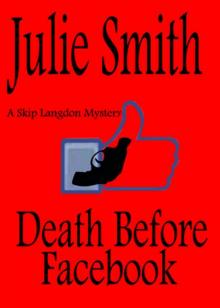 Death Before Facebook (Skip Langdon #4) (Skip Langdon Mystery) (The Skip Langdon Series)
Death Before Facebook (Skip Langdon #4) (Skip Langdon Mystery) (The Skip Langdon Series) P.I. On A Hot Tin Roof
P.I. On A Hot Tin Roof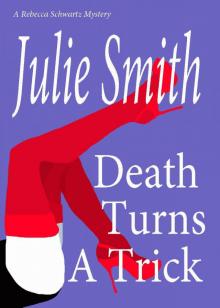 Death Turns A Trick (Rebecca Schwartz #1) (A Rebecca Schwartz Mystery) (The Rebecca Schwartz Series)
Death Turns A Trick (Rebecca Schwartz #1) (A Rebecca Schwartz Mystery) (The Rebecca Schwartz Series)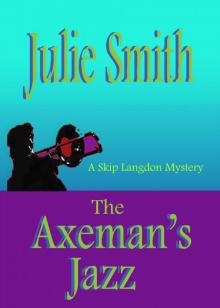 The Axeman's Jazz (Skip Langdon Mystery Series #2) (The Skip Langdon Series)
The Axeman's Jazz (Skip Langdon Mystery Series #2) (The Skip Langdon Series)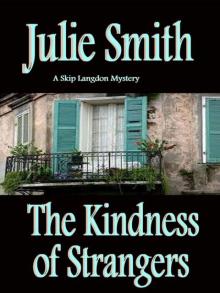 The Kindness of Strangers (Skip Langdon Mystery #6) (The Skip Langdon Series)
The Kindness of Strangers (Skip Langdon Mystery #6) (The Skip Langdon Series)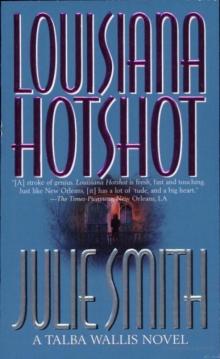 Louisiana Hotshot
Louisiana Hotshot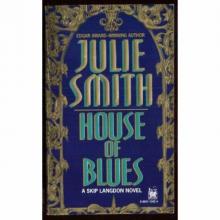 House of Blues
House of Blues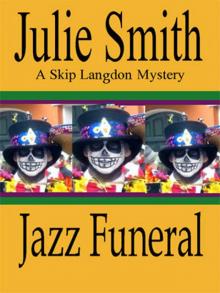 Jazz Funeral (Skip Langdon #3) (Skip Langdon Mystery) (The Skip Langdon Series)
Jazz Funeral (Skip Langdon #3) (Skip Langdon Mystery) (The Skip Langdon Series) Tourist Trap (Rebecca Schwartz #3) (A Rebecca Schwartz Mystery) (The Rebecca Schwartz Series)
Tourist Trap (Rebecca Schwartz #3) (A Rebecca Schwartz Mystery) (The Rebecca Schwartz Series)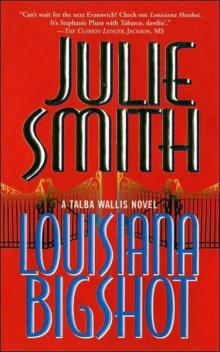 Louisiana Bigshot
Louisiana Bigshot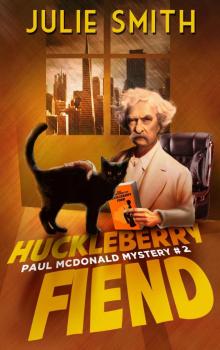 Huckleberry Fiend
Huckleberry Fiend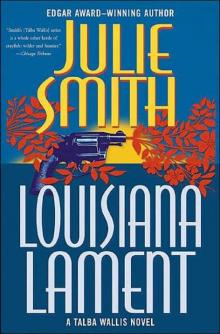 Louisiana Lament
Louisiana Lament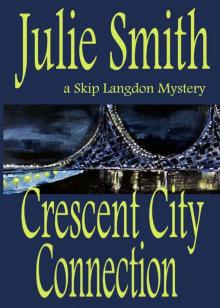 Crescent City Connection (Skip Langdon Mystery #7) (The Skip Langdon Series)
Crescent City Connection (Skip Langdon Mystery #7) (The Skip Langdon Series)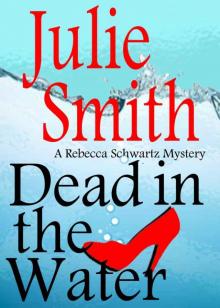 Dead In The Water (Rebecca Schwartz Mystery #4) (The Rebecca Schwartz Series)
Dead In The Water (Rebecca Schwartz Mystery #4) (The Rebecca Schwartz Series)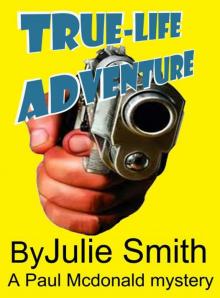 True-Life Adventure
True-Life Adventure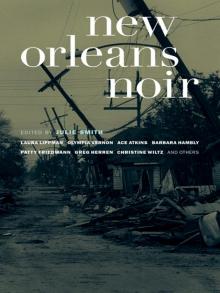 New Orleans Noir
New Orleans Noir